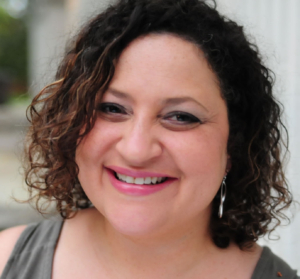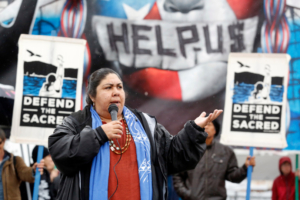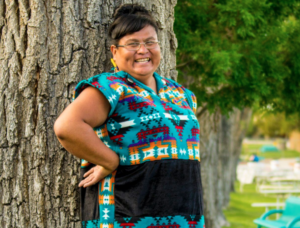In honor of National Native American & Indigenous Peoples Heritage Month, OppNet honors three individuals who have dedicated their careers in academia, advocacy, and activism to the empowerment and recognition of their communities.
Malinda Maynor Lowery (Lumbee)
Professor, Scholar, Filmmaker

Malinda Maynor Lowery is one of the most lauded voices in the country on American Indian identity and history in the South. A North Carolina native born in Lumberton and raised in Durham, Lowery is currently a Professor of History at the University of North Carolina at Chapel Hill and the Director of the Center for the Study of the American South. Her first book Lumbee Indians in the Jim Crow South: Race, Identity, and the Making of a Nation garnered Lowery extensive academic recognition. The book explores how the Lumbee people uniquely conceptualized their identity as American Indian, during a time of stark racial segregation and against a backdrop of the black/white racial binary prevalent in the South. In addition to perceptions of Native American identity, Lowery has also written a number of essays, produced films and television series focusing on American Indian migration; federal recognition; music, food, and culture; and more. Lowery has been featured in a number of publications including The New York Times and Oxford American literary magazine and has had two of her films premiered at the Sundance Film Festival.
Corrina Gould (Ohlone)
Community Organizer and Activist

Corrina Gould plays a critical role in advocating for her community's right to their ancestral lands that have been urbanized and gentrified in the San Francisco Bay Area in California. In 2011, Gould and other organizers sought to prevent the construction of a waterfront property project in the Bay Area, which was also the site of the Ohlone people's ancestral home. The occupation lasted 109 days and yielded the Sogorea Te Land Trust, an agreement to allow community use of these lands and the buyback of parts of the property. Through her work as lead organizer for the Indian People Organizing for Change (IPOC), a nonprofit based in the Bay Area focusing on social and environmental justice, Gould is currently at the forefront of the fight to preserve a site in Berkeley, California that is the earliest known settlement in the region at nearly 5,000 years old. Gould also sits on the California Indigenous Environmental Association Board, and the Board of Directors for the Oakland Emiliano Zapata Street Academy Foundation.
Mattee Jim (Diné/Navajo)
Community and Public Health Advocate

For nearly twenty years, Mattee Jim has been a leader in transgender advocacy, focusing her HIV/AIDS prevention work on First Nations communities in her home state of New Mexico. Jim has been a prominent voice, having presented at several national and international conferences, as well as serving in a number of community-based organizations and state-wide agencies. Jim is one of the community co-chairs for the New Mexico Community Planning and Action group, an entity founded with the purpose of expanding HIV/AIDS treatment and support services to a diverse range of communities within the state. She also serves in a leadership capacity with the Transgender Resource Center of New Mexico, which seeks to provide direct services, advocacy, and education to those who identify as transgender, gender nonconforming, and non-binary. Jim is frequently asked to speak on behalf of the LGBTQ+ community in forums dedicated to issues within Native American and Indigenous communities at large. She was most recently honored by the Transgender Law Center for working to liberate transpeople and people living with HIV.

